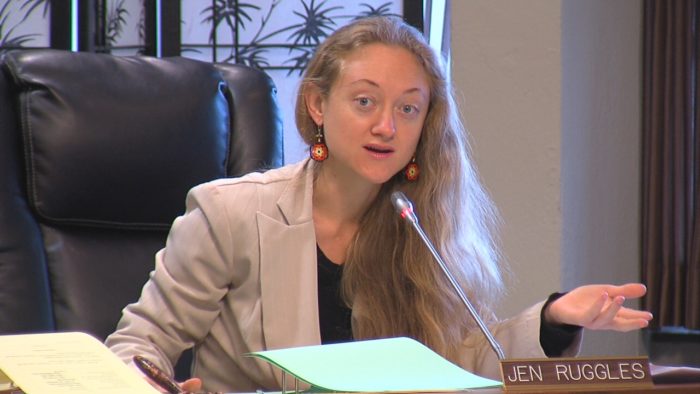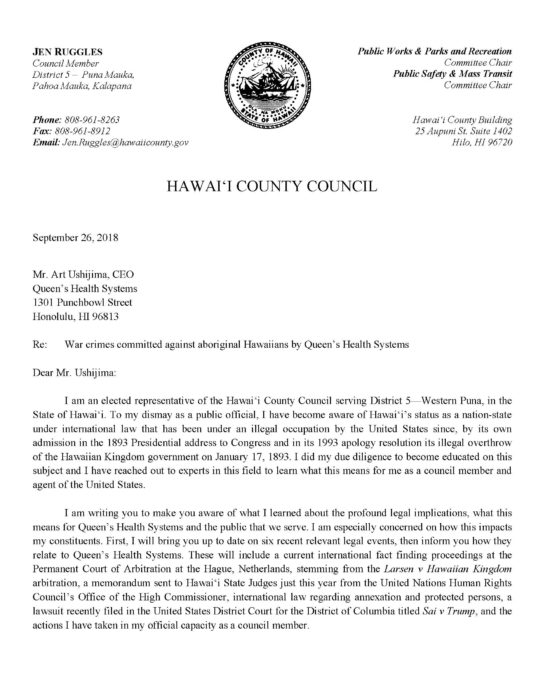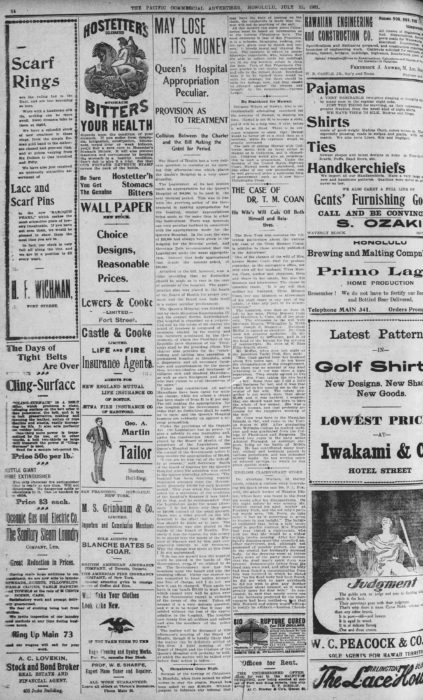 Council member Jen Ruggles released a letter she sent last week notifying Queen’s Health Systems of the illegal and prolonged occupation of Hawai’i and how it appears it may be violating the rights of protected persons in Hawai’i. She stated that she, as an agent for the United States, which is an occupying Power, and one who took an oath to support the constitution of the United States, is bound to uphold the 1907 Hague Convention, IV, and the 1949 Geneva Convention, IV, and ensure respect for the conventions in all circumstances.
Council member Jen Ruggles released a letter she sent last week notifying Queen’s Health Systems of the illegal and prolonged occupation of Hawai’i and how it appears it may be violating the rights of protected persons in Hawai’i. She stated that she, as an agent for the United States, which is an occupying Power, and one who took an oath to support the constitution of the United States, is bound to uphold the 1907 Hague Convention, IV, and the 1949 Geneva Convention, IV, and ensure respect for the conventions in all circumstances.
 In her letter Council member Ruggles referenced a February 25, 2018 communication from United Nations Independent Expert, Dr. Alfred M. deZayas, to the State of Hawai‘i judges in which he stated:
In her letter Council member Ruggles referenced a February 25, 2018 communication from United Nations Independent Expert, Dr. Alfred M. deZayas, to the State of Hawai‘i judges in which he stated:
“I have come to understand that the lawful political status of the Hawaiian Islands is that of a sovereign nation-state in continuity; but a nation-state that is under a strange form of occupation by the United States resulting from an illegal military occupation and a fraudulent annexation. As such, international laws (the Hague and Geneva Conventions) require that governance and legal matters within the occupied territory of the Hawaiian Islands must be administered by the application of the laws of the occupied state (in this case, the Hawaiian Kingdom), not the domestic laws of the occupier (the United States).”
The U.S. Senate ratified the Hague and Geneva Conventions making both of these treaties part of federal law under Article VI of the federal constitution and which must be faithfully carried out in territory that the United States is occupying. As a whistle blower, Council member Ruggles sees it as her duty to hold individuals and other officials of the State of Hawai‘i and the United States government accountable for violations of the provisions of the Hague and Geneva Conventions and the rights of civilians within the occupied territory under the title of protected persons.
Council member Ruggles came to learn that the Queen’s Hospital was formed as a corporation on June 20, 1859. Article One of the Hospital’s Charter provides for the establishment of a permanent hospital for the “treatment of indigent sick and disabled Hawaiians, as well as such foreigners and others who may choose to avail themselves of the same.” It was understood, at the time, that the term ‘Hawaiians’ meant aboriginal Hawaiians, both pure and part. Under the Charter, the Hawaiian Monarch served as President of a Board of Trustees comprised of ten persons to be appointed by the government and ten persons to be elected by corporation shareholders.
The government appropriated funding for the maintenance of the hospital.
In 1900, George W. Smith, a Trustee of Queen’s Hospital, stated in an article published by the Pacific Commercial Advertiser that “Queen’s Hospital is, from the nature of its charter, a quasi-private institution. When it was chartered it was provided that all Hawaiians of native birth, should be treated free of charge. Foreigners were to be treated by payment of fees.”
No other country or government in the world at the time is known by her to have had such a system of government subsidized health care for a majority of its national population which was free of charge. The Soviet government followed this practice in 1920, but that was due to the political theory of communism. After the Second World War, in 1948, the British government followed suit, which, like the Hawaiian Kingdom, was not a communist State. The Nordic countries followed with Sweden in 1955, Iceland in 1956, Norway in 1956, Denmark in 1961, and Finland in 1964. The United States has never subsidized health care free of charge.
After pressure to sever the Hawaiian government’s interest in Queen’s Hospital and to no longer admit native Hawaiians free of charge, the Board of Trustees, with the approval of Territorial Governor, Walter F. Frear, amended the Charter. In 1909, the phrase in the original 1859 Charter “for the treatment of indigent sick and disabled Hawaiians” was replaced with “for the treatment of sick and disabled persons.” The change was made secretively. The only news coverage it received at the time was in one newspaper, the Evening Bulletin, which made no mention of the change of servicing aboriginal Hawaiians free of charge. Under the title of “IS APPROVED TRUSTEES REDUCED,” the Bulletin wrote,
“By the new amendment to their character, the application for which was approved by Governor Frear this morning, the number of trustees of Queen’s Hospital will be reduced from twenty to seven members. The responsibility of the government trusteeship will also cease with the new articles of incorporation.”
By 1939, Victor Stewart Kaleoaloha Houston, a former Congressional delegate for the Territory of Hawai‘i, “was presenting lectures at various Hawaiian Civic Clubs castigating Queen’s Hospital for ignoring Native Hawaiians’ medical needs and reneging on the promises of the original charter. In newspapers the main themes of Houston’s one man challenge to Queen’s practices was set out for the public by these questions: What ever happened to free medical care for Hawaiians and what is Queen’s doing with the Queen Emma Trust monies?”
Gradually aboriginal Hawaiians were denied health care unless they paid, and as time went on, this provision of the Queen’s Hospital charter was nearly forgotten. In 1967, the name of Queen’s Hospital was changed to the Queen’s Medical Center. In 1985, the Queen’s Health Systems with a Board of Trustees was established as the parent company of Queen’s Medical Center along with Molokai General Hospital, North Hawai‘i Community Hospital, Queen Emma Land Company, Queen’s Development Corporation, and Queen’s Insurance Exchange. Under Queen’s Health Systems there are four hospitals—The Queen’s Medical Center, The Queen’s Medical Center – West O‘ahu, Molokai General Hospital, and North Hawai‘i Community Hospital—and seven health care centers in Hawai‘i Kai, Hilo, two in Honolulu, Kapolei, Kaua‘i and Kona. I will refer to the corporation by its original name, the Queen’s Hospital.
Hawaiian subjects of aboriginal blood, both pure and part, are protected persons whose rights during the U.S. occupation are protected under the Geneva Convention. Council member Ruggles sees that it is also her duty as a whistle blower and agent for the United States to ensure that their rights are respected and enforced. According to the Office of Hawaiian Affairs, “Today, Native Hawaiians are perhaps the single racial group with the highest health risk in the State of Hawai‘i. This risk stems from high economic and cultural stress, lifestyle and risk behaviors, and late or lack of access to health care.” The ‘lack of access to health care’ is what troubles Council member Ruggles knowing that the Queen’s Hospital was specifically established, under Hawaiian Kingdom law, to provide for their health care, free of charge.
According to the International Committee of the Red Cross Commentaries, Article 47 of the Geneva Convention means that “changes made in the internal organization of the State must not lead to protected persons being deprived of the rights and safeguards provided them. Consequently it must be possible for the Convention to be applied to them in its entirety, even if the Occupying Power has introduced changes in the institutions or government of the occupied territory.” Furthermore, under the provisions of Article 50 of the GCIV regarding preferential measures for children’s medical care, in this case with the Queen’s Hospital, the occupying State “who occupied the whole or part of a territory where such measures are in force, cannot on any pretext abrogate them or place obstacles in the way of their application. This rule applies not only to preferential measures prescribed in the Convention but to any other measures of the same nature taken by the occupied State.”
Council member Ruggles stated that the changes to the charter since 1909 violate the Hague and Geneva Conventions. In light of these violations, she called upon the Chief Executive Office of the Queen’s Health System, Mr. Art Ushijima, and the “Board of Trustees to comply with the 1859 Charter and to admit aboriginal Hawaiians, as that term was understood under Kingdom law, for medical care free of charge. Failure to do so [would] appear to constitute to constitute war crimes under Article 47 and 50 of the [Geneva Convention, IV].”
Council member Ruggles alerted Mr. Ushijima to the fact that there “seems to be a direct nexus of deaths of aboriginal Hawaiians as ‘the single racial group with the highest health risk in the State of Hawai‘i [that] stems from…late or lack of access to health care’ to the crime of genocide as defined by the 1948 Convention on the Prevention and Punishment of the Crime of Genocide. The Genocide Convention was also ratified by the United States Senate, and, like the Hague and Geneva Conventions, are a part of United States federal law.
#ProtectedPersonsHawaii
#WarCrimesHawaii

